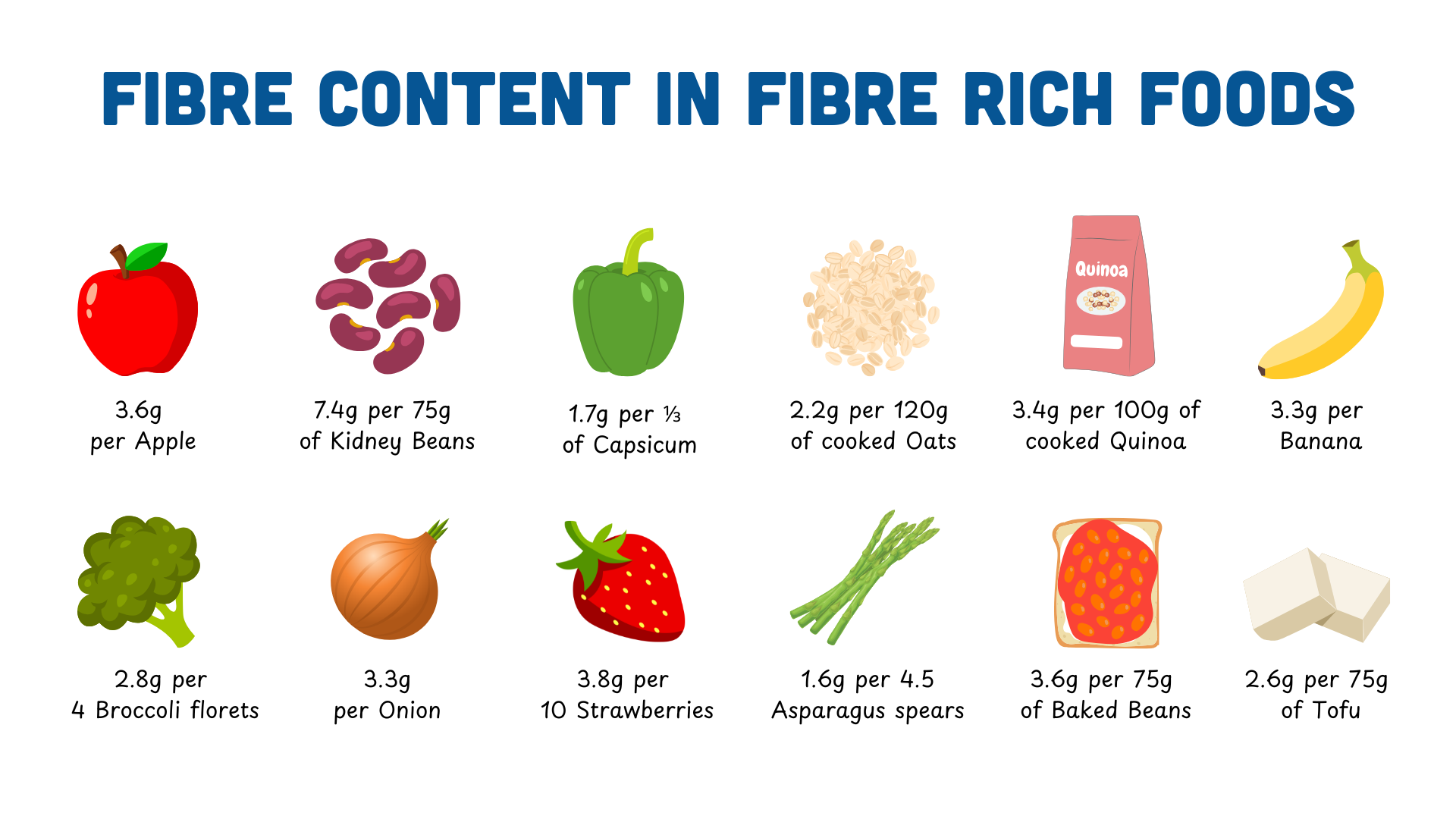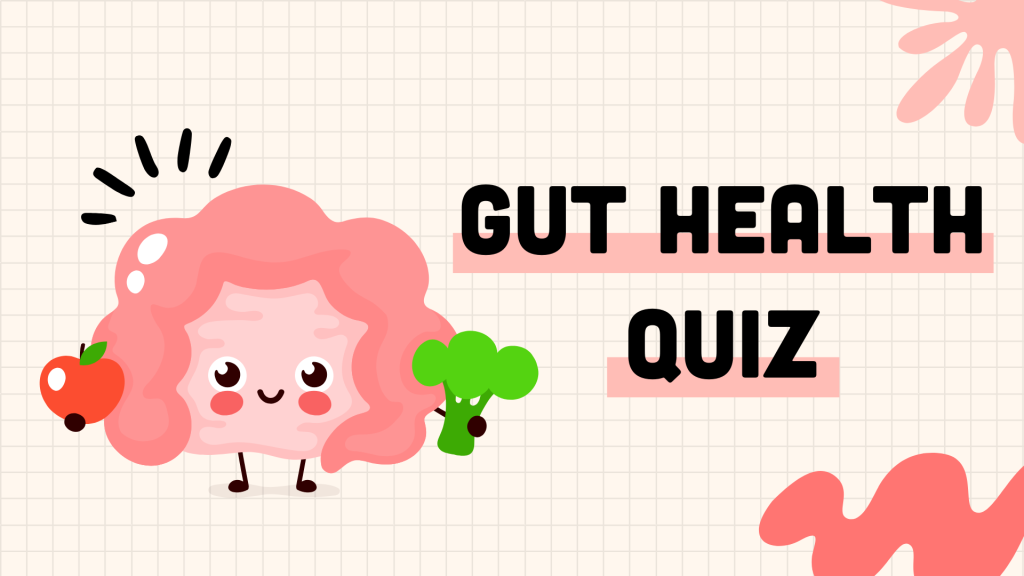The human Gastrointestinal (GI) tract is home to an abundant and diverse ecosystem of over 100 trillion types of bacteria and microorganisms, collectively known as the gut microbiota.1,2
The bacteria within your gut aid digestion by breaking down food and converting it into essential nutrients for your body to absorb and use.3 The health of our gut affects more than our digestion, and it plays a major role in our everyday functioning and overall physical and mental wellbeing.3,4
So how much do you know about intestinal health? Test your knowledge with our Gut Health Quiz below!
- What is one benefit of dietary fibre in gut health?
-
- A) Promotes muscle growth
- B) Breaks down fats
- C) Keeps your colon healthy by adding bulk to stool
- D) Relieves bloating
Answer:
C (Keeps your colon healthy by adding bulk to stool)
Explanation:
Dietary fibre is naturally present in the indigestible parts of plant foods, such as fruits, vegetables, wholegrains and legumes.3,4 Fibre resists digestion in the small intestine, and reaches the large intestine (colon) where it is fermented and broken down by gut bacteria.4
One of the key benefits of fibre is its ability to support a healthy colon by adding bulk to stool, which promotes regular bowel movements, and prevents constipation.3,5 Additionally, fibre may assist to reduce the absorption of harmful substances from the body and encourage its removal from the digestive tract.6
Tip: Aim for at least 5 serves of vegetables and 2 serves of fruit per day, as often as you can, to boost your fibre intake and support your overall health! 4,7
- A serve is ½ cup of cooked vegetables, or 1 cup of raw salad.7
- A serve is 1 medium sized fruit, or 1 cup of chopped or canned fruit.7
- Which of the following foods are highest in dietary fibre?
- A) Avocado
- B) Broccoli
- C) Kidney Beans
- D) Brown Rice
Answer:
C (Kidney Beans)
Explanation:
Red Kidney Beans are a rich source of dietary fibre, containing 7.4g of fibre per 75g serve.4 One serving size is based on the Australian Dietary Guidelines.4,7 Figure 1 below shows examples of foods high in fibre.4

Figure 1. Fibre content in fibre rich foods.4
- Fermented foods and beverages such as Yakult, kimchi, sauerkraut, kombucha and kefir are beneficial for gut health because they …?
- A) Keep you fuller for longer
- B) Eliminate all bacteria from the digestive system
- C) Lower blood pressure
- D) Contain live bacteria that support gut microbiome
Answer:
D (Contain live bacteria that support gut microbiome)
Explanation:
Some fermented foods and beverages may contain live bacteria that help support a healthy gut microbiome. However, it is important to note that not all fermented foods contain probiotics.8
Yakult is a fermented milk drink and the only product in the world to contain the unique probiotic bacteria Lacticaseibacillus paracasei Shirota strain (LcS for short). Probiotics are live microorganisms that help to maintain a healthy balance of bacteria in your gut. It does this by encouraging the growth of beneficial bacteria while suppressing the growth of potentially harmful bacteria.4
- What factors can help support a healthy gut?
- A) Drinking adequate amounts of water
- B) Limiting the consumption of ultra-processed foods
- C) Eating a variety of colorful plant foods
- D) All of the above
Answer:
D (All of the above)
Explanation:
All these options are fantastic ways to support a healthy gut! Water plays a crucial role in ensuring your digestive system functions smoothly. Insufficient fluid intake results in harder stools that can be difficult to pass.4
Fried and oily ultra-processed foods low in fibre can slow down the digestive process and may encourage the wrong types of bacteria to grow within the gut.4
Eating a rainbow of colorful fruit and vegetables provides your body with a wide variety of essential vitamins and minerals. Plant foods have been shown to help with digestion and can protect against inflammation and some chronic diseases.3,4,9
- Explore our blog, Eat the Rainbow: A Colorful Guide to Healthy Eating, for expert tips and practical advice on incorporating a vibrant array of plant foods in your diet!
- Which of the following might be a sign your gut needs a little extra care?
- A) Regular bowel movements
- B) Low energy levels
- C) Frequent constipation
- D) Feeling thirsty
Answer:
C (Frequent constipation)
Explanation:
An imbalance in the gut microbiome can lead to symptoms such as gas, bloating, constipation and diarrhoea. Constipation is defined as having fewer than three bowel movements per week, experiencing hard or painful stools, or passing small amounts of stool.3,4
So how many questions did you get right? We hope this quiz offered some valuable insight and enhanced your understanding of gut health!
We have created A Simple Guide to Intestinal Health to break down the basics of gut health, and offer practical, evidence-based tips to improve overall wellbeing.
Download our free guide here to take the next step in supporting your digestive health!
References:
- Valdes AM, Walter J, Segal E, Spector TD. Role of the gut microbiota in nutrition and health. BMJ. 2018;361:k2179. doi:10.1136/bmj.k2179
- Rinninella E, Raoul P, Cintoni M, et al. What is the healthy gut microbiota composition? A changing ecosystem across age, environment, diet, and diseases. Microorganisms. 2019;7(1):14. doi:10.3390/microorganisms7010014
- Better Health Channel. Gut health. Published October 2023. Accessed May 7, 2025. https://www.betterhealth.vic.gov.au/health/healthyliving/gut-health
- Yakult Australia. A simple guide to intestinal health. Accessed May 7, 2025. https://www.yakult.com.au/digestive-health/a-simple-guide-to-intestinal-health/
- Yakult Australia. Benefits. Published April 30, 2025. Accessed May 26, 2025. https://www.yakult.com.au/benefits/
- Wang H, Wang Z, Zhang S, et al. Fighting microplastics: the role of dietary fibers in protecting health. Food Front. Published online June 24, 2024. doi:10.1002/fft2.437
- National Health and Medical Research Council. The guidelines. Eat for Health. Published 2013. Accessed May 7, 2025. https://www.eatforhealth.gov.au/guidelines
- Canadian Digestive Health Foundation. Do all fermented foods contain probiotics? Published August 28, 2023. Accessed May 7, 2025. https://cdhf.ca/en/do-all-fermented-foods-contain-probiotics/
- Liang J, Wen Y, Yin J, Zhu G, Wang T. Utilization of plant-based foods for effective prevention of chronic diseases: a longitudinal cohort study. NPJ Sci Food. 2024;8(1):113. doi:10.1038/s41538-024-00362-y.
